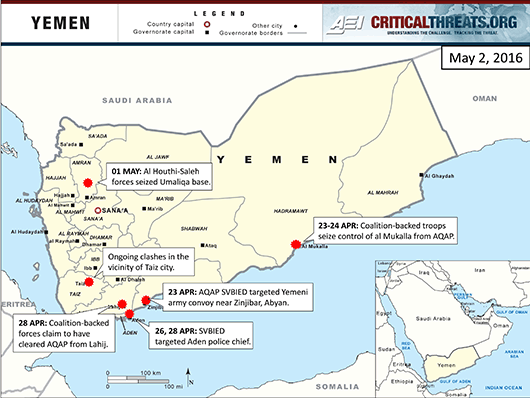The Saudi-led coalition backed Yemeni troops in a major offensive against al Qaeda in the Arabian Peninsula (AQAP), but recent gains against the group are unlikely to degrade its capabilities in the long term. AQAP is actively describing the Kuwait peace talks between Yemeni President Abdu Rabbu Mansour Hadi’s government and al Houthi and former Yemeni president Ali Abdullah Saleh’s government as negotiations to empower the al Houthis along with Yemen’s political elite, including Saleh.
The UN-led peace talks in Kuwait are suspended, but are likely to resume in the coming week. The Hadi delegation withdrew from the peace talks citing the al Houthi-Saleh forces’ seizure of a military base in Amran on May 1. The delegation remains in Kuwait and will probably receive international pressure, particularly from Saudi Arabia, to re-engage in the process. Al Houthi-Saleh forces attacked and took control of the Umaliqa base in Amran governorate at dawn. The unit stationed at the base had maintained its neutrality over the past year. The al Houthi-Saleh faction had previously cited continued violations of the ceasefire by the Saudi-led coalition as airstrikes continued. Both sides had submitted proposals for a political settlement that included plans for the withdrawal of forces and release of prisoners on April 29. The two proposals were to inform a general strategic framework for the talks. Resumed talks are unlikely to produce a negotiated settlement at this point, however.
AQAP has laid the groundwork for long-term support in southeastern Yemen and will be able to overcome the loss of al Mukalla, Hadramawt. AQAP has resurged from a similar setback in 2012, and it derives its strength from popular support, not territorial control. The Saudi-led coalition backed Yemeni forces in an offensive against AQAP in al Mukalla, the port-city capital of Hadramawt. The coalition-backed troops retook the city by April 24 without significant fighting. AQAP militants retreated to strongholds in Abyan, Ma’rib, and possibly al Bayda in advance of the offensive. The Saudi-led coalition spokesman briefed to western media that this is a major victory against AQAP. AQAP framed its withdrawal from al Mukalla, which it had held since April 2, 2015, as a strategic decision to protect the population. The April 30 statement accused the Hadi government and the UAE of cutting deals with the al Houthis and the “ousted” Saleh at the expense of the people. [Statement translated by SITE.] AQAP had actively contested a parallel offensive against its positions in Zinjibar and Ja’ar in Abyan, though emerging reports state that the group has negotiated its withdrawal on the condition that the Hadi government and partnered popular resistance committees refrain from entering the areas.
Coalition-backed security forces are attempting to secure Aden and Lahij, but face continued resistance from Salafi-jihadi and southern secessionist groups. A suicide vehicle-borne improvised explosive device (SVBIED) targeted Aden’s police chief on April 28 and again on May 1. It is likely that at least one VBIED cell remains operational in Aden after efforts to clear certain neighborhoods. Aden-based security forces under the command of Munir al Yafa’i cleared the road from Aden to Taiz in Lahij governorate and claimed control of the governorate. The forces had cleared AQAP militants from al Hawta, the capital of Lahij, on April 15. AQAP militants remain active in the governorate, however, as indicated by a recent attack on a checkpoint and coalition airstrikes targeting AQAP positions. Al Yafa’i had announced at the end of March that his objective was to secure Aden and Lahij.
The loyalty of the south is contested and both the al Houthi-Saleh and Hadi factions are reaching out for support. Al Houthi representatives have been meeting with southern leaders, possibly to peel away support from the Hadi government. Al Houthi member Saleh al Samad, the president of Ansarullah’s political council, and two other Ansarullah members met with a delegation from the Southern Movement faction that had supported the most recent National Dialogue initiative on April 25 in Sana’a. Ghalib Mutleq, who headed the southern delegation, had supported the al Houthi September 2014 coup. Nasser al Nuba, a southern brigadier general forcibly retired after the 1994 civil war who helped inspire the initial Southern Movement uprising in 2007, met with Yemeni Vice President Ali Mohsen al Ahmar on May 1 in Saudi Arabia. Nuba signaled his support for the Hadi faction earlier this month when he backed Ali Mohsen’s appointment as vice president. Hadi recently appointed Brigadier General Faraj Salman al Bahsani, a southern military officer who may have also been forcibly retired after the 1994 war, as the commander of the Second Military District.
Fighting continues in Taiz despite the ceasefire. Clashes are ongoing for control of al Dhabab, which controls the southwestern entrance to Taiz city. Al Houthi-Saleh forces continue to hold the road leading to the eastern and northeastern entrances to the city. Al Houthi-Saleh forces also hold Mokha port, though coalition forces are targeting their positions in the area.
The current round of peace talks are unlikely to produce a political settlement because the two factions still disagree on key points that would inform a framework for dialogue. Both sides will probably continue to engage in the talks as a means of displaying commitment to peace. AQAP will probably continue to support anti-al Houthi factions and will increasingly back tribal and political factions that are opposed to the Hadi government, too.
Jon Diamond and Jessica Kocan contributed significant research to this report.

